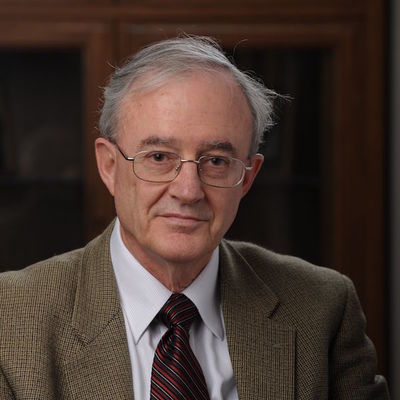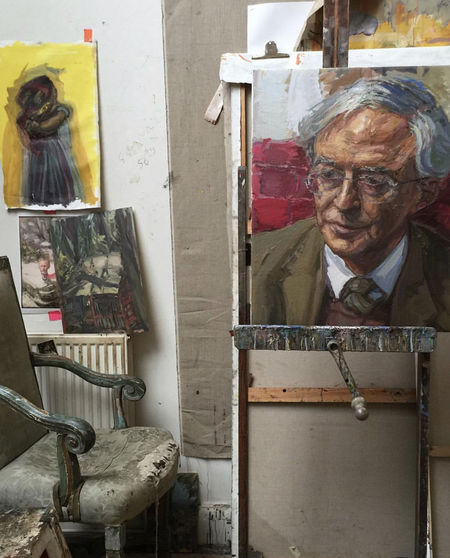Faculty and students celebrate Professor John Finnis as he moves to emeritus status

After a towering 25-year career in law teaching and legal scholarship at Notre Dame Law School, Biolchini Family Professor of Law John M. Finnis has decided to retire.
An internationally recognized scholar and philosopher, Finnis came to Notre Dame in 1995 from Oxford University, where he was a chaired professor of law and legal philosophy and a member of the philosophy subfaculty. At Notre Dame Law School, he is revered as much for his generous spirit as for his wide-ranging and groundbreaking work.
“John Finnis is one of the towering giants of the law, and one of the greatest legal philosophers to ever live,” said G. Marcus Cole, the Joseph A. Matson Dean and Professor of Law at Notre Dame Law School.
“It is no exaggeration to say that my own interest in law was sparked when, as an undergraduate student, I picked up a copy of John’s Natural Law and Natural Rights,” Dean Cole said. “I was mesmerized by the clarity and force of his argument. One of the greatest honors of my life came last year, when, like a star-struck schoolboy, I met him in person as his new dean, and asked him to sign my dog-eared copy of that book. I will treasure it, and that moment, always. Notre Dame Law School is blessed to have been the home of the great John Finnis.”
During his time at Notre Dame — August 1995 to June 2020 — Finnis published a steady flow of seminal works, including Aquinas: Moral, Political and Legal Theory (Oxford University Press, 1998), a new edition with an 80-page postscript of Natural Law and Natural Rights (Oxford University Press, 1980, 2011), five volumes of the Collected Essays of John Finnis (Oxford University Press, 2011), each with its own substantive introduction, and in 2013 his “Reflections and Responses” in Reason, Morality and Law: Essays in Honour of John Finnis, edited by John Keown and Robert P. George (Oxford University Press, 2013).

This formidable productivity came despite the fact that his reputation had been firmly established decades earlier by, among other things, the 1980 publication of his book Natural Law and Natural Rights, which Professor Gerard V. Bradley called “the single most important work in legal theory since Hart’s The Concept of Law was published in 1961, and a monumental achievement. Law students, professors, and judges will be reading it a century from now.”
Describing the opportunity to work alongside Finnis as co-editor of the American Journal of Jurisprudence as the greatest professional blessing of his life, Bradley noted that Finnis is not only a great legal philosopher. “He is a moral theologian accomplished enough to be named one of the first two lay members of the Catholic Church’s International Theological Commission,” Bradley said. “He also possesses a marvelous wit, though he is sparing in displaying it, and he is a devoted family man who has lived out his Christian vocation in a most exemplary way.”
Like Bradley, Professor Jeffrey Pojanowski also worked with Finnis at the American Journal of Jurisprudence, where he says he had “a front-row seat to witness the speed with which he offered incisive, detailed commentary on papers on a wide range of topics. And he did it all with gentle good humor — and the occasional wry barb that would always make me smile.”
The breadth of Finnis’s work, he said, “is simply stunning: general jurisprudence, ethics, constitutional law, theology, Aquinas, Shakespeare, scripture. He single-handedly revived the natural law tradition in Anglo-American general jurisprudence.” Still, Pojanowski said, although he is “one of the most important living legal philosophers in the world” he is also “a gentle and humble man — kind and welcoming to children, and a favorite of the staff at the Morris Inn where he took his meals. He never seeks to dominate conversations, but if you can get him going — say, on his days at Oxford with Hart and Dworkin, or his time teaching law and writing Natural Law and Natural Rights in Malawi — you are in for a treat. Having John as a mentor and a colleague has been a humbling joy.”
O’Toole Professor of Constitutional Law A.J. Bellia and Professor Paolo Carozza also stressed Finnis’s generosity to his colleagues.
Bellia pointed out that while Finnis’s vast contributions to legal philosophy and public discourse are widely recognized, “what people may not know is that in the quiet halls of academic life, he has been as generous and thoughtful a colleague as could be had. No one will ever measure the number of papers he has critiqued, the breadth of ideas he has discussed, the countless words of encouragement he has spoken. I will always be grateful for the support, kindness, and encouragement he showed me from my first days at Notre Dame.”
Carozza said he was struck by that same quality the moment he arrived at the Law School in 1996 as a young, untenured faculty member.
“It was a generosity not only of time but of spirit and mind,” Carozza said. “John was always ready to listen to an argument carefully, to work through it with precision, and to offer the most incisive contribution that invariably went to the essentials. He challenged me to go further in thinking about a problem, yet never did I sense that he was trying to direct me into his own line of thought rather than to deepen my own, to help me develop my own scholarly path. John modeled the same generosity toward our students. His was a model of intellectual friendship that I have desired to emulate ever since our first encounter.”
Finnis was appointed, and continues to serve, as Permanent Senior Distinguished Research Fellow of the de Nicola Center for Ethics and Culture at Notre Dame. Director (and Notre Dame Law Professor) Carter Snead said, “John was incredibly generous with the de Nicola Center, regularly speaking at our events, mentoring our undergraduate, graduate and law student Sorin Fellows, and providing sage advice. I feel personally blessed by his friendship and mentorship during my time at Notre Dame. We will miss having John over each semester for dinner in our home and pouring his favorite Australian wines!”
Second-year law student Michael Bradley ’14, ’17 MTS took as many Finnis courses as he could. While earning his master’s degree in theological studies, Bradley took four courses with Finnis at the Law School (his Shakespeare course, his Aquinas course, and two directed readings). He also had the chance to study with Finnis at Oxford in August 2019 and to attend six private seminars with him dating back to 2015, the most recent of which was this past January.
“Anyone familiar with Professor Finnis’s work can appreciate the precision and rigor with which he thinks and writes,” Bradley said. “Less evident to the reader of his written work are his patience and generosity of time and spirit. Studying with Professor Finnis is itself a lesson in how to think critically, fairly, and always in service to and for the sake of the truth of the matter under consideration. I consider myself very fortunate to have had the opportunity to be his student.”
As they prepare to move to Chile later this year, Johanna Fröhlich ’15 LL.M. and Pier Paolo Pigozzi ’10 LL.M., ’20 J.S.D. paused to offer an international perspective on their former professor.
Fröhlich explains: “Pier and I met during the 2014-2015 academic year at Notre Dame. By November we were engaged, and Pier invited Professor Finnis for dinner along with his fellow J.S.D. candidates and friends and colleagues from outside the Law School. We had a lovely evening with wine and ossobuco. I was amazed by how warm and kind Professor Finnis was — mellow, witty, and curious to get to know everyone. It was easy to feel completely natural about his presence with us. However, we were reminded of his extraordinary life when Pier’s roommate arrived later in the evening and realized that one of the characters in the movie ‘The Lady,’ which he just had watched, was sitting delightedly on our couch. [Finnis was portrayed by actor Anton Lesser in the 2011 film about Burmese leader Aung San Suu Kyi.] The next day, Pier would give me a six-volume collection of Finnis’s works for my 30th birthday.
“We both remain most grateful to Professor Finnis for the richness and depth of his insights, and for the tenderness and generosity with which he gave himself to his students — he will continue to inspire us in our academic and private lives.”
On the other hand, Richard Garnett , the Paul J. Schierl/Fort Howard Corporation Professor of Law, was just an undergraduate when he first encountered Finnis.
“I had the privilege of sitting in on a jurisprudence seminar that he was co-teaching at Oxford University with several other luminaries. It was a feast — intimidating, for sure, but still a feast — although I did my best simply to blend in to the wall. I ended up writing an undergraduate thesis that was critical (or so I imagined) of some aspects of Professor Finnis’s account of the natural law and, without my knowing, my professor shared the thesis with Finnis. Seven years later, when I was interviewing for a faculty position at Notre Dame, I was introduced to Professor Finnis and he smiled and said, ‘Ah, yes, if I recall, you wrote a very ... confident undergraduate thesis.’ And he has been a mentor, role model, and friend ever since.”
Garnett will be gratified to learn of Michael Bradley’s decision to jump at every chance he had to study with Finnis. “I like to tell our law students,” Garnett said, “they should take any course Professor Finnis offers, because he has the ‘biggest brain on record.’ At the same time, he is unfailingly charitable, approachable, and warm.”
He said one of his favorite Finnis memories is of a faculty-student softball game, about 20 years ago, “to which John showed up in tweedy ‘plus fours,’ looking like a golfer out of a P.G. Wodehouse novel. I nervously assigned him the position of right field and even more nervously watched, a little while later, as a sharp line drive was sent out that way. No need to worry: He deftly fielded it, and then proceeded to drill it in to second base in cricket-bowler fashion.”
Finnis is now working on a book on the foundations and historical truth of Christian revelation, which he hopes to follow with a historical study of Shakespeare’s works and associates.
He offered these thoughts to his colleagues and students: “I appreciated and enjoyed every day of my long association with my teaching and research and library colleagues, the supporting staff, and the able and earnest students at Notre Dame Law School (and ND London), and I hope there will be occasions to revisit or re-meet. Gerry Bradley had the idea, back in 1994, of broadening my scholarly, publishing, and mission horizons, and the whole quarter-century experience of NDLS exceeded even his and Dean (now Fr.) David Link’s advertisements. Thank you!”